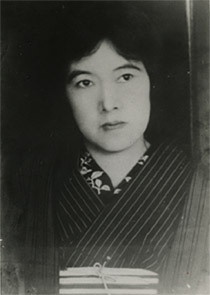 Yosano Akiko
Yosano Akiko
(7 December 1878 – 29 May 1942)
Yosano Akiko is one of the most famous, and most controversial, post-classical woman poets of Japan and is best remembered for her innovative and controversial use of the tanka verse form. Akiko (born Otori Akiko) was born on 7 December 1878 in Sakai, a town south of Osaka, to a highly prosperous merchant family. From an early age she demonstrated an avid interest in literature, which she pursued after her formal schooling ended. As a young woman Akiko attended meetings of the literary societies in Sakai. Her first published works were traditional poems that imitated classic Japanese literature. The growing influence in Japan of European Romanticism led to the development of "new poetry," which condoned the expression of personal feelings and expanded the vocabulary of poetic diction. In their search to define a modern Japanese poetic voice, modern poets and dramatists have both revived old forms and created new means of expression. It was in this literary milieu that Akiko wrote the passionate poetry for which she became best known. Her poetry openly expresses personal experience, especially romantic love, in language that was perceived as highly emotional and sexually explicit to readers in early twentieth-century Japan. In 1901 Akiko moved to Tokyo to be with Yosano Hiroshi, a writer and editor whom she married later that year, shortly after the publication of her first book of poemsMidaregami (Tangled Hair). Hiroshi was a central figure in the Japanese Romantic movement and founder of the Shinshi Sha, ("New Poetry Society") which published the "new poetry" journal Myōjō ("Bright Star"). After Myōjō ceased publication in 1908, Akiko wrote prolifically to help support her family. She gave birth to 13 children, 11 of whom survived to adulthood. Akiko wrote over 20 volumes of poetry and social commentary; essays ranged from feminist tracts to criticism of Japan's foreign aggression, and her poetry reflects some of these concerns as well; also broke social taboos with poems about experiencing labour pains and the birth of her stillborn baby; published translations into modern Japanese of Murasaki Shikibu's classic Genji monogatari (The Tale of Genji, 1912 and 1939) and Shinyaku Eiga Monogatari ("Newly Translated Tale of Flowering Fortunes"); also published a monumental compilation of 26,783 poems (incl. haiku, tanka etc) written by 6,675 poets in modern times. A prominent pacifist and feminist, Yosano Akiko spoke out against the Sino-Japanese war and the growing nationalistic fervour of the times. She later founded a woman's college, the Bunka Gakuin in 1921 and made constructive statements on problems of women and education. Akiko died on 29 May 1942.
Bibliography of her major works:
· Midaregami [Tangled Hair] (poetry) 1901
· Sadgi (poetry) 1904
· Koigoromo (poetry) 1905
· Fukaku (unfinished novel) 1908
· Shundeishu (poetry) 1911
· Akarumi e (novel) 1913
· Parii yori (essays) 1914
· Watakushi no oitachi (autobiography) 1915
· Zakki-cho (essays) 1915
· Hito oyobi onna to shite, University of California Libraries (January 1, 1916)
· Akiko kawa (criticism) 1919
· Hi no tori (poetry) 1919
· Yushosha to nare (essays) 1934
· Hakuoshzu (poetry) 1942
· The Poetry of Yosano Akiko (poetry) 1957
· Teihon Yosano Akiko zenshu (poetry) 1980
· Yosano Akiko kasha (poetry) 1986
Some English editions:
· River of Stars: Selected Poems of Yosano Akiko, Shambhala Publications (18 Mar. 1997);
· Travels in Manchuria and Mongolia: A Feminist Poet from Japan Encounters Prewar China, Yosano Akiko, Columbia University Press (5 Oct. 2001);
· Tangled Hair, Yosano Akiko, Palisade Press, (Dec 2012).
Selected work:
Nagisa naru
Sutareshi fune ni
Mizu michite
Shiroku utsureru
Hatsu-aki no sora
Left on the beach
Full of water,
A worn out boat
Reflects the white sky
Of early autumn.
-Yosano Akiko
[from: ONE HUNDRED MORE POEMS FROM THE JAPANESE, by Kenneth Rexroth, New Directions, 1974]
*
Black hair
Tangled in a thousand strands.
Tangled my hair and
Tangled my tangled memories
Of our long nights of love making.
Not speaking of the way,
Not thinking of what comes after,
Not questioning name or fame,
Here, loving love,
You and I look at each other.
This autumn will end.
Nothing can last forever.
Fate controls our lives.
Fondle my breasts
With your strong hands.
Press my breasts,
Part the veil of mystery,
A flower blooms there,
Crimson and fragrant.
I can give myself to her
In her dreams
Whispering her own poems
In her ear as she sleeps beside me.
Left on the beach
Full of water,
A worn out boat
Reflects the white sky
Of early autumn.
*
LABOR PAINS
I am sick today,
sick in my body,
eyes wide open, silent,
I lie on the bed of childbirth.
Why do I, so used to the nearness of death,
to pain and blood and screaming,
now uncontrollably tremble with dread?
A nice young doctor tried to comfort me,
and talked about the joy of giving birth.
Since I know better than he about this matter,
what good purpose can his prattle serve?
Knowledge is not reality.
Experience belongs to the past.
Let those who lack immediacy be silent.
Let observers be content to observe.
I am all alone,
totally, utterly, entirely on my own,
gnawing my lips, holding my body rigid,
waiting on inexorable fate.
There is only one truth.
I shall give birth to a child,
truth driving outward from my inwardness.
Neither good nor bad; real, no sham about it.
With the first labor pains,
suddenly the sun goes pale.
The indifferent world goes strangely calm.
I am alone.
It is alone I am.
(Translations from Japanese by Kenneth Rexroth:
http://www.bopsecrets.org/rexroth/translations/japanese.htm#Modern%20Women%20Poets)
Sources:
http://en.wikipedia.org/wiki/Akiko_Yosano
http://www.ndl.go.jp/portrait/e/datas/347.html
http://lilliputreview.blogspot.co.uk/2010/07/on-scented-breeze-yosano-akiko.html
http://bashosroad.outlawpoetry.com/yosano-akiko-encore/yosano-akiko/haiku/
http://www.infoplease.com/encyclopedia/entertainment/japanese-literature-postwar-literature.html
http://www.infoplease.com/encyclopedia/people/yosano-akiko.html
http://www.enotes.com/topics/yosano-akiko/critical-essays/akiko-yosano#critical-essays-akiko-yosano-principal-works
